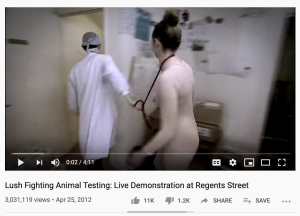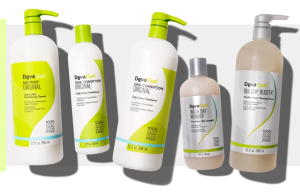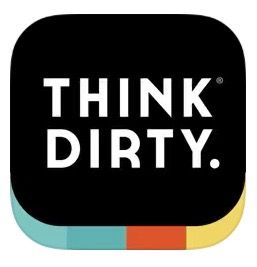I still recall the first time I learned about animal cruelty and testing cosmetic products on animals. In 2012, a demonstrative advertisement was put out on YouTube by LUSH, a cruelty free and natural cosmetic company. This socially experimental advertisement highlighted how cruelly test animals are treated. For those unaware, some of the most common test subject animals include monkeys, rabbits, cats, dogs and small rodents.

The LUSH advertisement showed a human being undergoing the tests that a typical animal test subject goes through. According to PETA, 219 animals are killed in test labs in the United States every minute.
The test subject was a woman and she was displayed in a storefront window. She was naked, chained down to a table, blindfolded and gagged. Products were put on her body and sprayed into her eyes and mouth. Her eyes and mouth were held open by metal hooks and chains. Her hair was dyed and then shaved. She was screaming in agony.
I found the nature of the video to be too disturbing to share.

Perhaps the most disturbing piece of the video is the ending. When the test subject is spent, she is wrapped up in a garbage bag and thrown into the trash. This is what poor, innocent animals go through on a daily basis in testing facilities across the globe. LUSH works hard to spread awareness about animal testing and putting an end to it. This storefront window stunt was an act to get people to sign a petition to put an end to cosmetic testing on animals.
This video shook me to my core. I still remember it so vividly, even eight years later. Seeing a human endure what test animals have to go through, although on a more PG-13 level than what actually goes on behind the closed doors of animal testing facilities, was horrifying. It made me seriously question why big companies think that testing their products on animals is ethical or necessary. In my mind, if you are creating a product that you know could be potentially harmful to humans, why produce it anyways? Why test it on an innocent animal when humans and animals are completely different beings?
After watching this advertisement I decided to do a little research about the products I regularly used. If you know me, you know I love everything beauty and skincare. Google told me that more than half of the products I used to use on a daily basis were tested on animals. I was shocked, to say the least. Some of the most surprising brands that still test on animals included Maybelline, Neutrogena, Origins and Clinique, just to name a few.
Since seeing the LUSH video, I now no longer purchase cosmetic items that are tested on animals or contain animal products because I refuse to give my money to these brands to help further fund more animal cruelty. Today, some of my favorite cruelty-free brands are Milk Makeup, ColourPop Cosmetics, Too Faced and Drunk Elephant.
One brand, although it is cruelty free, has come under major fire on social media in the last few weeks. DevaCurl, a globally popular haircare brand, has caused hair loss and hair damage in a number of its users. Many (now former) DevaCurl fans had been using the products for several years and are now struggling to find products that match the effects that DevaCurl products provide for them.

Gabriella Ayala, political science major, says that DevaCurl products are the only products she used to use on her hair. Thanks to some Googling, Alaya discovered that DevaCurl hair products are the cause of her baby hairs breaking off and her hair thinning. She found that there are other DevaCurl users suffering from the same hair damage, and, in fact, DevaCurl has a class-action lawsuit against them for these hair issues.
Ayala now uses the app, “Think Dirty,” to make sure that products that she is interested in are cruelty free and safe for her. She says that although she cares about animals and doesn’t want her products to be tested on them, the choice to go cruelty-free is more personal. Ayala wants her haircare, skincare and makeup to be cruelty-free so they don’t damage her body.

PETA, the People for the Ethical Treatment of Animals, has a petition on their website for those wanting to “help keep the pressure on those responsible for cruel tests” conducted on animals. You can pledge to be cruelty-free amongst many other animal lovers across the globe.


